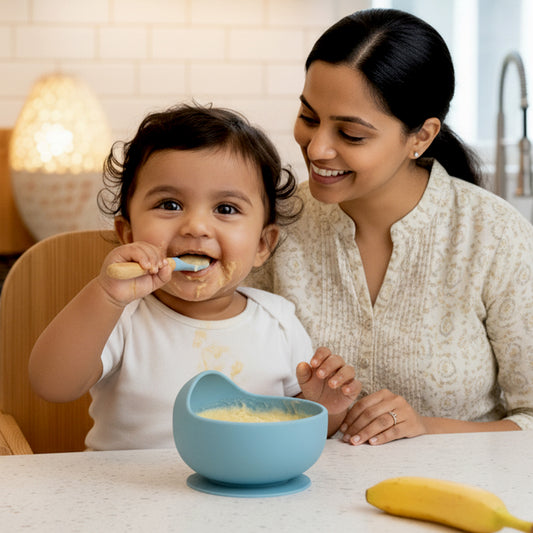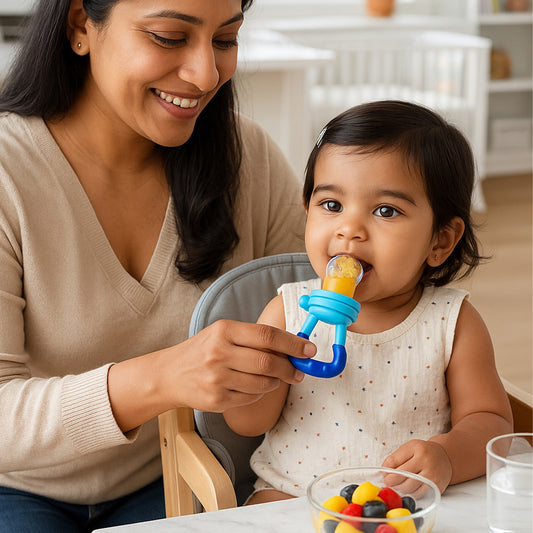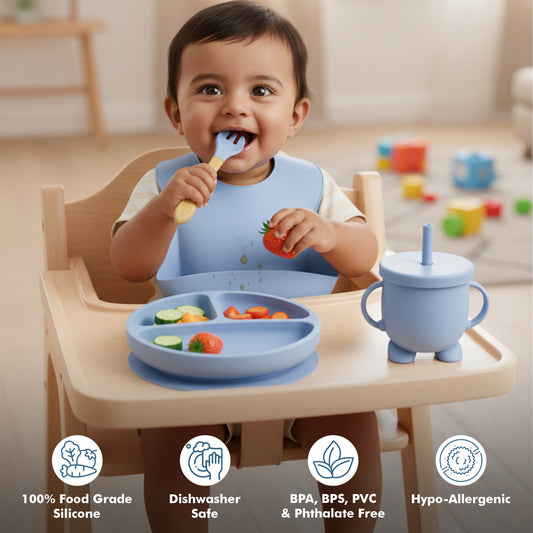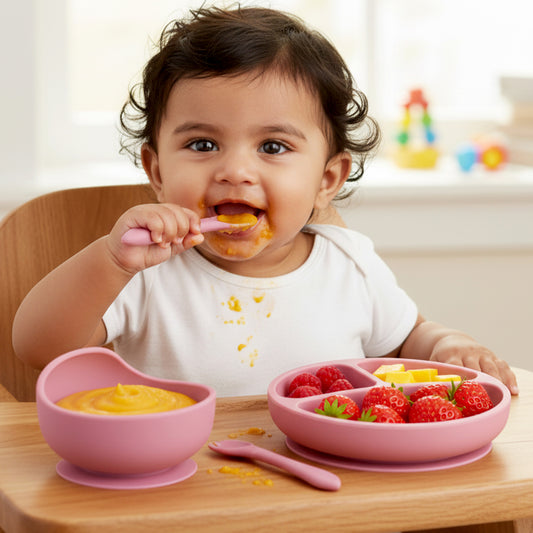At an average age of 6 months, the babies are most often prepared to begin with solid foods because by this age, they are able to sit upright and gain interest in food.
Start with such single-ingred (without additives) soft foods as rice cereal, mashed banana, or pureed vegetables and breast milk or formula.
Such a move as solids is a wonderful milestone to both you and your baby.
It is not only about nutrition, but the first time of your little one tasting new foodstuffs, feeling new textures and even eating styles.
We will do it in stages to learn when, what and how to introduce solid food to your child in a safe way.
Understanding the Importance of Solid Foods for Infants
About six months onward, your baby becomes increasingly nutritionally demanding; breast milk or formula will not be sufficient to fulfill his nutritional needs, in particular, those of iron and zinc. The introduction of solid foods is beneficial:
- Fill important nutrient gaps
- Strengthen chewing and swallowing skills
- Develop fine motor skills like holding a spoon or picking food
- Establish positive dietary patterns forever.
When to Start Solid Food for Baby
The Right Age to Begin
Majority of the babies are prepared to have solids at the age of 6 months.
Premature weaning (before 4 months old) may be tough on the baby tummy and may cause choking.
It is possible to keep breastfeeding or formula feeding and gradually start feeding on solids as once or twice a day.
Signs Your Baby Is Ready for Solid Food
Your baby may be ready if they:
- Is able to sit up with a little support.
- Hold their head steady
- Open their mouths, when they are offered something to eat.
- Show interest in what you eat
- Losing the tongue-thrust reflex (pushing food out without pushing it)
Common Myths About Starting Solids
- “Adding cereal in the bottle will make baby sleep- False! It can cause choking.
- “Early solids make babies stronger- No, your baby might not be ready to digest solids so early.
First Solid Foods for Babies
Ideal First Foods to Start With
Begin with low-calorie and easy to digest foods that contain iron like:
- Rice or ragi cereal
- Mashed fruits (banana, apple, pear)
- Pureed vegetables (carrot, pumpkin, sweet potato)
- Dal water or mashed lentils
Eat foods simple and never use sugar or salt.
Food Textures by Age
|
Baby Age |
Texture |
Examples |
|
6–7 months |
Smooth purees |
Mashed banana, rice cereal |
|
8–9 months |
Slightly lumpy |
Mashed khichdi, boiled vegetables |
|
10–12 months |
Soft finger foods |
Cooked carrot sticks, small idli pieces |
How to Introduce New Foods
- Introduce one food at a time
- Allow 3 days to pass between attempts to eat a new food.
- Watch for any allergies or tummy upset
How to Feed Your Baby Safely
Setting the Right Mealtime Routine
- Choose a calm time (not when baby is sleepy or cranky)
- Start with 1–2 spoons, once a day
- Slowly add amount when baby gets accustomed to eating.
Feeding Tools & Hygiene
- Use a soft baby spoon
- Wash hands and utensils correctly always.
- Ensure that your baby sits up when he or she is taking food.
Should You Add Cereal to a Baby’s Bottle?
No No addition of cereal to milk bottles is not suggested. It amplifies the risks of choking, and does not assist babies to sleep better. Spread the feed pellets by a spoon instead.
When to Introduce Finger Foods
Signs Your Baby Is Ready for Finger Foods
Infants tend to express interest in self-feeding usually between 8-10 months. Signs include:
- Picking small food pieces
- Eating soft food, attempting to chew, or gum.
- Enjoying holding food themselves
Best First Finger Foods
- Soft fruits like banana, papaya, or mango slices
- Boiled vegetables like carrot or sweet potato sticks
- The small dosa or soft cooked rice.
Foods to Avoid (Choking Hazards)
- Whole nuts, grapes, popcorn, raw carrots
- Sticky food like peanut butter lumps
- Huge pieces of meat or fruits.
Introducing Allergenic Foods
When to Introduce
Introduce allergenic foods like eggs, peanuts, or fish between 6–12 months (unless advised otherwise by your doctor).
Common Allergenic Foods
- Cow’s milk, eggs, peanuts, soy, wheat, fish
- Everything should begin with small portions and monitor responses.
When to Seek Medical Advice
In case of rash, vomiting, swelling, and breathing problems in your baby, call on your pediatrician.
Water, Juice & Other Drinks
Does Your Baby Need Water?
Once your baby starts solids, offer small sips of water during meals. Before 6 months, breast milk or formula gives enough hydration.
Should You Give Juice?
Avoid juice before 12 months. Rather, use puree of fresh fruit or smashed fruit as a source of natural sweetness and fiber.
Changes After Starting Solids
It is also normal to observe the changes in the poop of the baby, it can be thicker, darker or smellier.
Mild constipation may also occur among some babies. Give additional breast milk or little water to facilitate digestion.
Building Healthy Eating Habits Early
Encourage Self-Feeding
Allow your little baby to touch, hold and feel food. It assists them to grow up as self-reliant feeders.
Make Mealtime Fun
Sample Feeding Schedule (6–12 Months)
|
Age |
Meals per Day |
Example Menu |
|
6–8 months |
2–3 small meals |
Mashed banana + rice cereal |
|
9–12 months |
3 meals + 1–2 snacks |
Soft khichdi + yogurt + fruit |
Homemade vs. Store-Bought Baby Food
Homemade Food
Pros: Fresh, nutritious, customizable
Cons: Needs time & effort
Store-Bought Food
Pros: Convenient for travel
Cons: Always check labels for sugar, salt, or preservatives
Look for organic or natural baby food brands that use real fruits and grains.
What Not to Feed Infants
- Honey (risk of botulism)
- The primary drink before 1 year Cow milk.
- High-level sweets, salty, or processed food.
- Undercooked eggs or meat
FAQs About Solid Food for Infants
Q: What will I do with my baby who refuses solids?
Ans: Try again later. There are cases when babies require time to adapt.
Q: How much food should I offer?
Ans: Begin using small portions of foods 1-2 spoon at a time and gradually go bigger when your baby takes care of them.
Q: Should I stop breastfeeding after solids?
Ans: No, continue breast milk or formula until at least 12 months.
Q: Can I add spices or ghee?
Ans: You can add a little after 8 months to give it taste.
Key Takeaways for Parents
- Start solids around 6 months
- Start with iron-rich, soft foods.
- Join one new food at a time.
- Avoid sugar, salt, and honey
- Keep on with milk feeding and solids.
Final Thoughts
Starting solids is a big step, but don’t worry — every baby learns at their own pace. Being patient, make it fun and celebrate every new taste that your baby finds.













